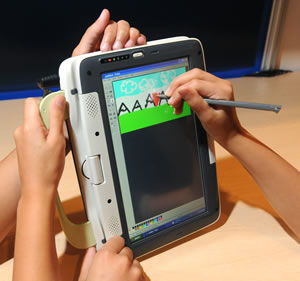
With so many education stakeholders debating the needs of today’s schools, student voices aren’t always heard when it comes to what they want from their education.
And while it’s important to note what businesses would like to see in their future employees, at the end of the day it really comes down to the students themselves.
We recently asked eSchool News readers: “What’s the one thing you hear most often from students about what they want in school?”
Though the responses were numerous, readers repeated these five things students want the most (responses edited for brevity). What do you think of this list? Share your thoughts in the comments section below.
5. Interactive technology
“My fourth grade students want more interactive technology. I have four computers in my classroom, one provided by the school and three provided by me. My students use them for math, writing, researching, and interactive math and word games. They also want more time to reflect on what they learn. They especially want more hands-on science where they can experiment, discuss, and reflect on what they observed, and then redo the activity. Too often, because we have so much to cover in the curriculum, deeper understanding is lost in the milieu.” —Mike Larzelere
4. Teacher mentors
“A teacher who respects and cares about them, a teacher who engages them in learning rather than constantly ‘telling’ them what they should learn, and a curriculum that explains the ‘what’ and ‘why’ and connects it to their lives.” —Gary S. Mathews, Ph.D., superintendent, Newton County School System, Georgia
3. Innovation
“We do an exit survey with our seniors, and the one comment I hear most often is the teacher is ‘boring.’ Why can’t they make the class interesting? I understand that there are tests, etc., but one could still make the class a welcoming place instead of a dreaded one. The teachers [who] are still using overhead projectors should be run out of town! Are they modeling acceptance of change? Nope, not when they’re stuck in the 70’s.” —Barbara A. Jimerson, title VII director, Gowanda School District, New York
“Students indicate an ongoing desire to learn—but in more fun, creative ways.” —Tina Kissell, administrator, Student Services, Instructional Design and Innovation Team, Moore County Schools, North Carolina
“As the mom of three girls (8th, 5th, and 3rd grades), the one thing I hear most often is that they are tired of school because it is ‘boring.’ When I ask about what happens in their classrooms, it sounds to be the same types of activities I did in school at their age. And yet, my children’s lives are much different than mine was 30 years ago, with significant changes in technology in every aspect of our lives. I try to engage them in learning activities at home through various websites and online gaming opportunities, though, and they soak it up! So, as a teacher, I see this as a cry from students to really engage them in their own technological language—using those tools they play with at home to teach them while they are at school.” —Joni Templin, Auburn University Montgomery, Center for Government & Public Affairs
2. Choice
“The one thing that students want most in school can be summed up in one word: Choice.” —Tricia George, principal, Sojourner School, North Clackamas School District, Oregon
“Upattinas School is an open and democratic program. Our students say, overwhelmingly: Freedom to participate in decision making—for themselves and their school.” —Sandra M. Hurst
“I am a K-6 teacher/librarian maintaining two libraries and connecting teachers and students with information. I see 800 students. They say more art and music and our choice of books in the library.” —Elaine Caffarelli, BSED, MLS teacher/librarian, Bethel/Penn-Bernville Elementary School Libraries, Tulpehocken Area School District
“Students want choice in what classes they have to take and what they do in class. They want choice in what they read and write, which math classes they take, and more elective choices. Although the core classes are important, so are the electives. Are we not educating a whole person? Students also want choice within the class. Often students ask, why can’t we slow down, either because of difficulty or because of interest? Answer: Choice is not an option for the teacher if he/she is going to meet state requirements. Also, students want to be able to pick what they read, read books at the appropriate level, and write about what interests them. Yet, schools can’t afford to buy different books, nor are teachers encouraged, and in some cases allowed, to offer students choice.” —Sherril Studley
“I want to do things I like.” —Diane Fee
1. Real-world application and relevancy
“Classes that pertain to the ‘real world,’ such as financial planning and a ‘senior seminar’ type class that provides practical information immediately prior to graduation.” —Mary Graft, cooperative education program director, Huntley High School, Career & Technology Education Department
“The one complaint I hear from students at South University is that they want more practical, hands-on experience and not just lectures and homework. I have worked hard to provide as much hands-on as possible. In computer programming class, students start writing programs on day one. In systems analysis classes, students begin a term project the third week of class that culminates with a complete analysis of a hypothetical systems problem. My one disappointment is that our network administrators will not allow us to have students set up and experiment with computer networks due to a perceived notion that students will damage the corporate network. I have begun to build my own stand-alone network that does not connect to the campus network and am beginning to offer students the opportunity to experiment. So far, this technique is working well and students have learned a lot. I strongly believe I can produce graduates ready for jobs in the 21st-century workforce.” —James R. Anthos, ABD, MBA, MSCIS, South University – Columbia| Information Technology Program Director, South Carolina
“Most often heard from students: ‘Why do I need to know this?’” —Anne Seifert
“Our students truly desire educational experiences outside the classroom. They desire to see and experience, first-hand, how they can apply their learning with real-world experiences during the normal school day.” —Paul M. Rutherford, Ph.D., Summit Technology Academy, Lee’s Summit R7
- #4: 25 education trends for 2018 - December 26, 2018
- Video of the Week: Dealing with digital distraction in the classroom - February 23, 2018
- Secrets from the library lines: 5 ways schools can boost digital engagement - January 2, 2018







Comments are closed.